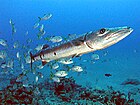Related Research Articles

Seafood is any form of sea life regarded as food by humans, prominently including fish and shellfish. Shellfish include various species of molluscs, crustaceans, and echinoderms. Historically, marine mammals such as cetaceans as well as seals have been eaten as food, though that happens to a lesser extent in modern times. Edible sea plants such as some seaweeds and microalgae are widely eaten as sea vegetables around the world, especially in Asia.

Angling is a fishing technique that uses a fish hook attached to a fishing line to tether individual fish in the mouth. The fishing line is usually manipulated via a fishing rod, although rodless techniques such as handlining also exist. Modern angling rods are usually fitted with a fishing reel that functions as a cranking device for storing, retrieving and releasing out the line, although Tenkara fishing and traditional cane pole fishing are two rod-angling methods that do not use any reel. The fish hook itself can be additionally weighted with a denser tackle called a sinker, and is typically dressed with an appetizing bait to attract and entice the fish into swallowing the hook, but sometimes an inedible fake/imitation bait with multiple attached hooks is used instead of a single hook with edible bait. Some type of bite indicator, such as a float, a bell or a quiver tip, is often used to relay underwater status of the hook to the surface and alert the angler of a fish's presence.

Fishery can mean either the enterprise of raising or harvesting fish and other aquatic life or, more commonly, the site where such enterprise takes place. Commercial fisheries include wild fisheries and fish farms, both in freshwater waterbodies and the oceans. About 500 million people worldwide are economically dependent on fisheries. 171 million tonnes of fish were produced in 2016, but overfishing is an increasing problem, causing declines in some populations.
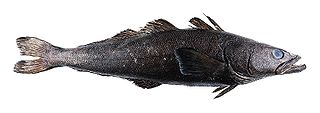
The Patagonian toothfish, also known as Chilean sea bass, mero, icefish, and Antarctic cod, is a species of notothen found in cold waters between depths of 45 and 3,850 m in the southern Atlantic, Pacific, and Indian Oceans and Southern Ocean on seamounts and continental shelves around most Subantarctic islands.
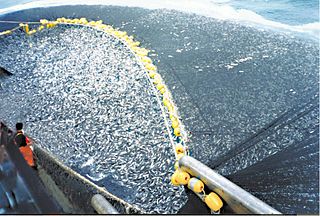
Overfishing is the removal of a species of fish from a body of water at a rate greater than that the species can replenish its population naturally, resulting in the species becoming increasingly underpopulated in that area. Overfishing can occur in water bodies of any sizes, such as ponds, wetlands, rivers, lakes or oceans, and can result in resource depletion, reduced biological growth rates and low biomass levels. Sustained overfishing can lead to critical depensation, where the fish population is no longer able to sustain itself. Some forms of overfishing, such as the overfishing of sharks, has led to the upset of entire marine ecosystems. Types of overfishing include: growth overfishing, recruitment overfishing, ecosystem overfishing.

The goal of fisheries management is to produce sustainable biological, environmental and socioeconomic benefits from renewable aquatic resources. Wild fisheries are classified as renewable when the organisms of interest produce an annual biological surplus that with judicious management can be harvested without reducing future productivity. Fishery management employs activities that protect fishery resources so sustainable exploitation is possible, drawing on fisheries science and possibly including the precautionary principle.
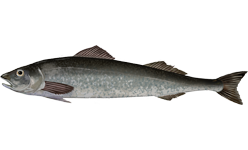
The sablefish is one of two members of the fish family Anoplopomatidae and the only species in the genus Anoplopoma. In English, common names for it include sable (US), butterfish (US), black cod, blue cod (UK), bluefish (UK), candlefish (UK), coal cod (UK), snowfish, coalfish (Canada), beshow, and skil (Canada), although many of these names also refer to other, unrelated, species. The US Food and Drug Administration accepts only "sablefish" as the acceptable market name in the United States; "black cod" is considered a vernacular (regional) name and should not be used as a statement of identity for this species. The sablefish is found in muddy sea beds in the North Pacific Ocean at depths of 300 to 2,700 m and is commercially important to Japan.

The Federal Ministry of Food and Agriculture, abbreviated BMEL, is a cabinet-level ministry of the Federal Republic of Germany. Its primary headquarters are located in Bonn with a secondary office in Berlin. From 1949 to 2001 it was known as the Ministry for Food, Agriculture and Forests. Through an organizational order by the German Chancellor on 22 January 2001, it became the Federal Ministry for Consumer Protection, Food and Agriculture after the Consumer protection function was transferred from the Federal Ministry for Health. The name Federal Ministry for Food, Agriculture and Consumer Protection was adopted on 22 November 2005 simply to alphabetize its functional parts in the German language. Due to the political restructurings of the 18th German Bundestag in December 2013 the division "Consumer Protection" was transferred to the Federal Ministry of Justice and Consumer Protection.
Individual fishing quotas (IFQs), also known as "individual transferable quotas" (ITQs), are one kind of catch share, a means by which many governments regulate fishing. The regulator sets a species-specific total allowable catch (TAC), typically by weight and for a given time period. A dedicated portion of the TAC, called quota shares, is then allocated to individuals. Quotas can typically be bought, sold and leased, a feature called transferability. As of 2008, 148 major fisheries around the world had adopted some variant of this approach, along with approximately 100 smaller fisheries in individual countries. Approximately 10% of the marine harvest was managed by ITQs as of 2008. The first countries to adopt individual fishing quotas were the Netherlands, Iceland and Canada in the late 1970s, and the most recent is the United States Scallop General Category IFQ Program in 2010. The first country to adopt individual transferable quotas as a national policy was New Zealand in 1986.
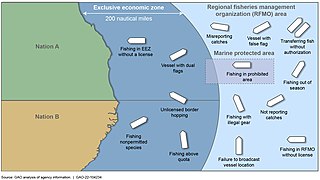
Illegal, unreported and unregulated fishing (IUU) is an issue around the world. Fishing industry observers believe IUU occurs in most fisheries, and accounts for up to 30% of total catches in some important fisheries.

The environmental impact of fishing includes issues such as the availability of fish, overfishing, fisheries, and fisheries management; as well as the impact of industrial fishing on other elements of the environment, such as bycatch. These issues are part of marine conservation, and are addressed in fisheries science programs. According to a 2019 FAO report, global production of fish, crustaceans, molluscs and other aquatic animals has continued to grow and reached 172.6 million tonnes in 2017, with an increase of 4.1 percent compared with 2016. There is a growing gap between the supply of fish and demand, due in part to world population growth.

The Food and Health Bureau (FHB) was a policy bureau of the Government of Hong Kong from 2007 to 2022 that managed food hygiene, environmental hygiene and health policies in Hong Kong. It was led by the Secretary for Food and Health (SFH) during its existence.
Sustainable seafood is seafood that is caught or farmed in ways that consider the long-term vitality of harvested species and the well-being of the oceans, as well as the livelihoods of fisheries-dependent communities. It was first promoted through the sustainable seafood movement which began in the 1990s. This operation highlights overfishing and environmentally destructive fishing methods. Through a number of initiatives, the movement has increased awareness and raised concerns over the way our seafood is obtained.
Discards are the portion of a catch of fish which is not retained on board during commercial fishing operations and is returned, often dead or dying, to the sea. The practice of discarding is driven by economic and political factors; fish which are discarded are often unmarketable species, individuals which are below minimum landing sizes and catches of species which fishers are not allowed to land, for instance due to quota restrictions. Discards form part of the bycatch of a fishing operation, although bycatch includes marketable species caught unintentionally. Discarding can be highly variable in time and space as a consequence of changing economic, sociological, environmental and biological factors.
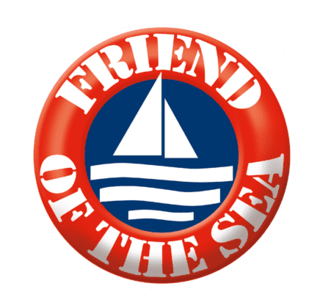
Friend of the Sea is a project of the World Sustainability Organization for the certification and promotion of seafood from sustainable fisheries and sustainable aquaculture. It is the only certification scheme which, with the same logo, certifies both wild and farmed seafood.
Catch share is a fishery management system that allocates a secure privilege to harvest a specific area or percentage of a fishery's total catch to individuals, communities, or associations. Examples of catch shares are individual transferable quota (ITQs), individual fishing quota (IFQs), territorial use rights for fishing (TURFs), limited access privileges (LAPs), sectors, and dedicated access privileges (DAPs).
The following outline is provided as an overview of and topical guide to fisheries:

Fisheries law is an emerging and specialized area of law. Fisheries law is the study and analysis of different fisheries management approaches such as catch shares e.g. Individual Transferable Quotas; TURFs; and others. The study of fisheries law is important in order to craft policy guidelines that maximize sustainability and legal enforcement. This specific legal area is rarely taught at law schools around the world, which leaves a vacuum of advocacy and research. Fisheries law also takes into account international treaties and industry norms in order to analyze fisheries management regulations. In addition, fisheries law includes access to justice for small-scale fisheries and coastal and aboriginal communities and labor issues such as child labor laws, employment law, and family law.
The Fisheries Law Centre (FLC) is a grassroots non-profit research centre headquartered in Vancouver, British Columbia, Canada. Although FLC is based in Canada, its outreach is global with researchers located in many countries around the world. FLC aims to ensure family fishermen’ access to justice, to protect marine environment, to help coastal communities become more resilient, and to assist consumers in accessing safe and sustainable seafood through research, education, and legal representation.
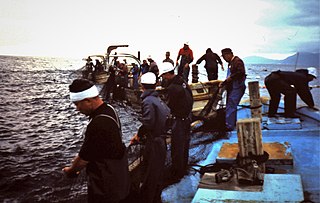
A fishery cooperative, or fishing co-op, is a cooperative in which the people involved in the fishing industry pool resources, in their certain activities from farming, catching, distribution, and marketing of fish.
